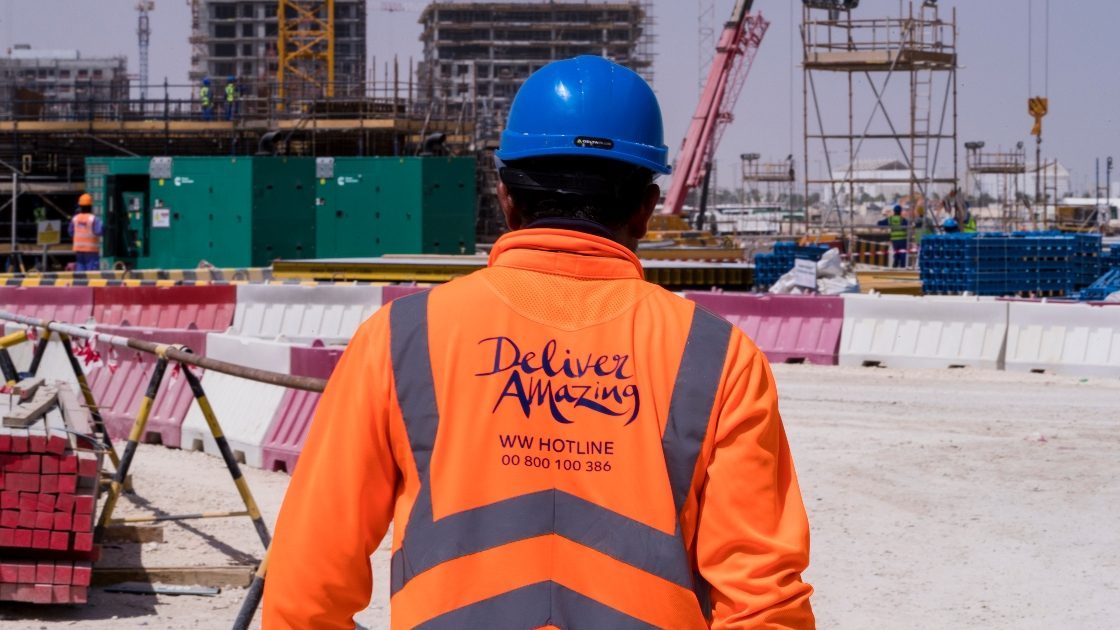The Norwegian proposal comes last on FIFA’s agenda before Infantino’s final statements, which are due to be made in Kigali.
FIFA will be pushed to make payments to migrant workers and the relatives of those who lost their lives or suffered injuries while working on World Cup stadiums in Qatar at an upcoming conference of national football federations.
Football officials from Norway will bring up the subject at the FIFA Congress meeting on 16 March in Kigali, human rights group Amnesty International said on Wednesday. It will be the first such instance where more than 200 federations gather after a competition.
“It is past time for FIFA to be held accountable for its human rights commitments and for it to respond with a clear action plan that will deliver justice for workers and their families,” Amnesty’s head of economic and social justice, Steve Cockburn, said in a statement.
FIFA will be urged by the Norwegian proposal to uphold its policy promise to offer relief when it has “caused or contributed to adverse human rights impacts.”
“This is an opportunity for Gianni Infantino, FIFA’s president, to finally put things right for the workers that made the tournament possible,” said Cockburn, according to reports.
Infantino is expected to win re-election with little opposition in Rwanda, where FIFA will publish its annual report revealing that the World Cup’s financial reserves increased by more than a factor of two to about $4 billion in 2022.
Thousands of construction workers, many of them were from South Asia, were hired to build stadiums, hotels, highways, metro lines, as well as other significant projects as part of Qatar’s mega World Cup preparation plans.
Many migrant labourers “suffered wage theft, illegal recruitment fees, injuries and even death” in Qatar, according to Cockburn.
Qatar has been criticised for its perceived lack of transparency into the exact figures of worker deaths and injuries, leading to disputed numbers.
Norway was the first European football organisation to call on FIFA to support the creation of an official compensation fund, though these have been dismissed by Qatari government officials as a “publicity stunt” that disregard funds and systems already in place to compensate workers.
“Despite widespread concern among football associations, players and sponsors, FIFA has still failed to commit to ensuring that migrant workers, who suffered wage theft, illegal recruitment fees, injuries and even death connected to the hosting of the tournament in Qatar are compensated for their suffering,” Cockburn said, according to Amnesty.
‘Hundreds of millions paid’
Qatar’s Labour Minister Ali bin Samikh Al Marri said in November Doha has already paid out hundreds of millions of dollars in unpaid wages.
Al Marri’s comments were the first such official government remarks to respond to the #PayUpFIFA campaign, a collective appeal by human rights groups for FIFA to match the tournament’s $440 million in prize money with compensation for migrant workers who have experienced human rights violations during the tournament’s preparations.
The Workers’ Support and Insurance Fund, established by Qatar in 2018 to benefit unpaid workers, had given out $320 million by November 2022, according to the Qatari minister. “If there is a person entitled to compensation who has not received it, they should come forward and we will help them,” he said, adding that Qatar was prepared to examine cases from more than a decade ago.
“Every death is a tragedy,” Al Marri said, adding: “There is no criteria to establish these funds.”
However, the Norwegian football federation claimed this is “neither accessible to workers who have left the country nor able to support families of workers who have died because those deaths were not investigated,” as quoted by reports.
Norway’s proposal on the FIFA agenda calls for “a commitment to assess whether it has fulfilled its responsibility to remedy related to the 2022 World Cup, including an investigation into World Cup-related deaths and injuries, and if not, how this responsibility can be fulfilled.”
FIFA will also be asked to make sure that a human rights strategy is included in all future tournaments it plans to host.
The Norwegian proposal comes last on FIFA’s agenda before Infantino’s final statements, which are due to be made in Kigali, the capital of Rwanda.
In the lead up to the World Cup, Qatar faced heavy scrutiny on its human rights record, with particular focus on migrant workers in the Gulf state.
However, Doha has repeatedly stressed that it has responded to criticism by introducing major reforms over the years, most notably the dismantling of the controversial kafala, or sponsorship, system.
Scrutiny continued throughout the sports tournament, with officials in Qatar and beyond saying the “unprecedented attack” by western media has largely disregarded key labour reforms in the country.







